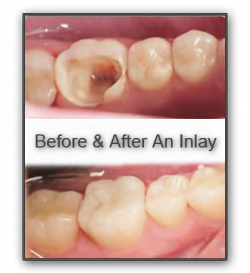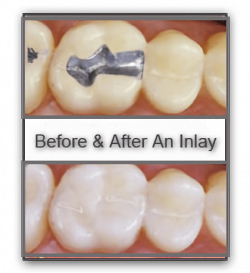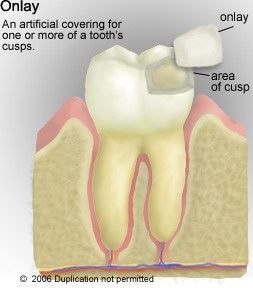Inlays & Onlays

*Both available as same-day procedures through Cerec technology!
A Dental Inlay, or Onlay, is bigger than a filling, but smaller than a crown. They are the solution to a problem that calls for something more than a simple tooth fillings without the dramatic procedure of replacing a damaged tooth with a crown.


Inlays
Dental inlays are used to repair decaying teeth that do not require extensive bridgework, or to replace older metal fillings. Most dental inlays are composed of porcelain, though some can be made from gold, or composite resin. Patients that desire a natural smile often request porcelain inlays instead of metal fillings because they are highly undetectable.
There are many benefits that come with the installation of dental inlays. One of the most important benefits is the fact that customized, bonded inlays do not leave room for bacteria to enter the tooth area. Since dentists are able to closely adhere inlays to the tooth, the possibility of further decay is greatly diminished.
While metal fillings can contract, and expand according to food temperature, dental inlays are not subject to either hot ,or cold food conditions. In addition, dental inlays allow a dentist to preserve a larger amount of a patient’s natural tooth. When metal fillings are used, a larger portion of the tooth must be eliminated.
Inlays last up to thirty years, which is significantly longer than any other type of filling. Due to their longevity, and durability, the placement of inlays often prevents the need for further dental work at a later time. Another important aspect of inlays is the fact that they can strengthen teeth up to seventy percent, which often prevents future tooth breakage, or loss.

Onlays
Made of a strong, natural-looking material, such as porcelain, onlays are larger restorations, extending over one or more sides of your tooth, and can be used similar to a crown or cap. A conservative tooth restoration that requires far less tooth removal than its metal counterpart, an onlay increases tooth strength and provides enduring protection for the tooth.
Unlike metal fillings, an onlay can often be used to repair only the damaged portion of the tooth, leaving much more of the original tooth structure intact.
Recovery Expectations
Recovery from the preparation for the temporary Onlays, and the bonding of the final restoration are similar to that of having a cavity filled. The patient may experience some discomfort, or tenderness in the area.
Ibuprofen can be used to reduce these symptoms. If any excessive discomfort becomes apparent please call our office at (386) 624-7658.
Complications
Am I a Candidate
. . .
